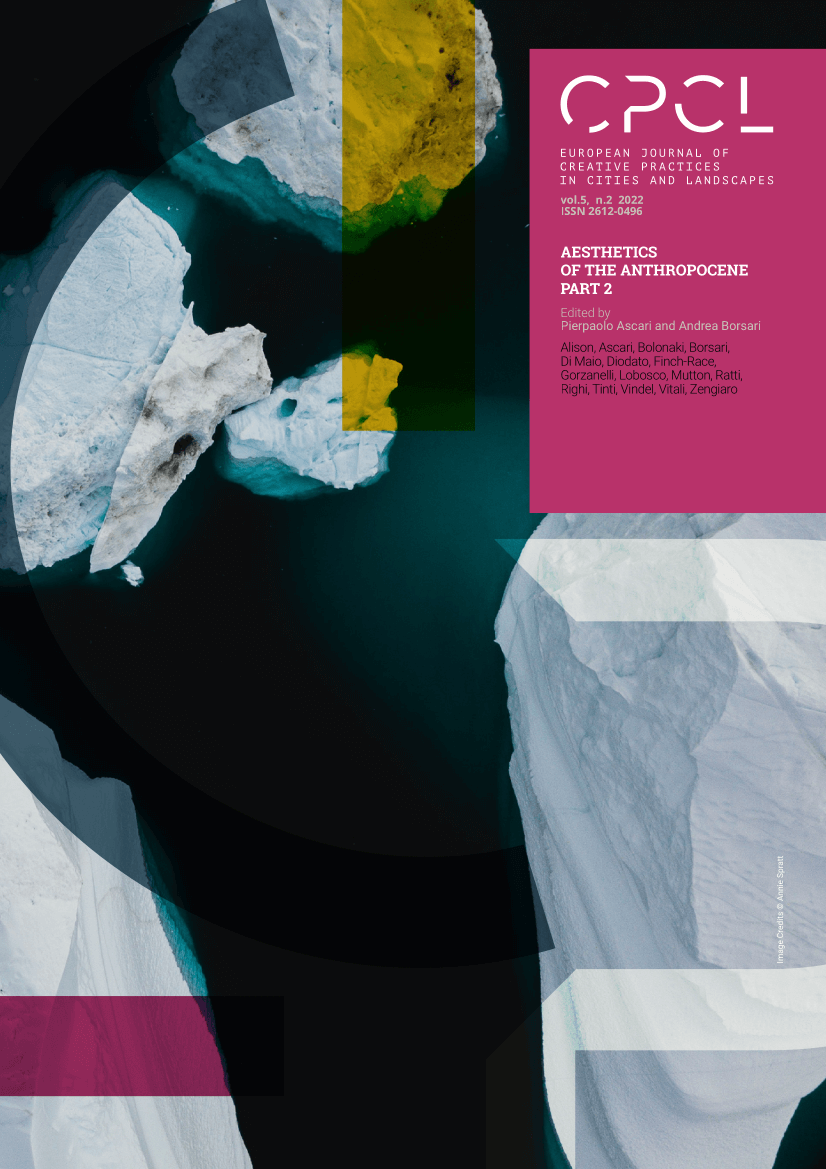Landscape in Transition. The Agency of Time in Understanding and Representing the Landscapes of the Anthropocene
DOI:
https://doi.org/10.6092/issn.2612-0496/15320Keywords:
Landscape Architecture, Landscape Representation, Time Based Drawing, Design ProcessAbstract
This contribution examines the representation of landscape temporal scale as a driver for landscape design and planning, questioning the univocal relationship between human and environmental processes, both from an aesthetic and procedural point of view. The aim of controlling and measuring the physical space by representing it has progressively evolved into an attempt to narrate the dynamic, ecological and social interactions that characterize its change in order to aesthetically penetrate the reality of objects that ontologically withdraw from us. Design directions can be developed from the quantification and representation of environmental time-based processes and directed towards future-oriented landscape transformations strategies and imagery. Among these perspectives, this essay interweaves the concepts of time and space, exploring how this merging represent a prerequisite for landscape designers, and a necessary exercise for students, in order to critically address design practices within the context of landscapes in transition.
References
Argan, Giulio Carlo. L'arte moderna 1770/1970. Firenze: Sansoni, 1978.
Borremans, Raymond. Le grand dictionnaire encyclopédique de la Côte d'Ivoire, Tome 2. Abidjan: Nouvelle Éditions Africaines, 1988.
Châteauneuf, Louis-François Benoiston and Picquet, Charles. Rapport sur la marche et les effets du choléra-morbus dans Paris et les communes rurales du Département de la Seine. Paris: Imprimerie Royal, 1834.
Corboz, André. "The land as palimpsest." Diogenes 31.121 (1983): 12-34. https://doi.org/10.1177/039219218303112102
Corner, James. ''The Agency of Mapping: Speculation, Critique and Invention'', in Mappings, ed. Denis Cosgrove (London: Reaktion Books, 1999), 213-252.
Mathur, Anuradha and Da Cunha, Dilip. Mississippi floods: designing a shifting landscape. Yale: Yale University Press, 2001.
Deleuze, Gilles and Guattari, Félix. A Thousand Plateaus: Capitalism and Schizophrenia. Translated by Brian Massumi. Minneapolis: University of Minnesota Press, 1987.
Fisk, Harold N. Geological Investigation of the Alluvial Valley of the Lower Mississippi River: US Army Corps of Engineers. Vicksburg: Mississippi River Commission, 1944.
Girot, Christophe et al., Topology. Topical Thoughts on the Contemporary Landscape. Berlin: Jovis Verlag GmbH, 2013.
Lemaire, Gérard-Georges. Monet, in Art dossier. Firenze: Giunti Editore, 1990.
Morris, Christopher. “Reckoning with “the Crookedest River in the world”: The maps of Harold Norman Fisk”, The Southern Quarterly 52(3) (2015): 30–44.
Harman, Graham. Guerrilla metaphysics: Phenomenology and the carpentry of things. Chicago: Open Court, 2011.
———. Object-oriented ontology: A new theory of everything. London: Penguin Book, 2018.
Koolhaas, Rem and Mau, Bruce. S, m, l, xl. New York: The Monacelli press, 1995.
Krinitzsky, Ellis L. “The contributions of H.N. Fisk to engineering geology in the Lower Mississippi Valley”. Engineering Geology 45(1) (1996): 45–58.
https://doi.org/10.1016/S0013-7952(96)00006-3
Lobosco, Gianni. “Visualising Time and Uncertainty. Harold Fisk’s Mississippi River Maps”. Oase 107 (2021): 114-115.
Morton, Timothy. Hyperobjects: Philosophy and Ecology after the End of the World. Minneapolis: University of Minnesota Press, 2013.
Pevzner, Nicholas and Sen, Sanjukta. “Preparing Ground. An Interview with Anuradha Mathur and Dilip da Cunha”. Places Journal (2010).
Rundstrom, Robert A. "A cultural interpretation of Inuit map accuracy", Geographical review (1990): 155-168. https://doi.org/10.2307/215479
Repton, Humphry. Fragments on the Theory and Practice of Landscape Gardening. London: J. Taylor, 1816
Snow, John. “On the mode of communication of cholera”, Salud publica de Mexico 33.2 (1991): 194-201.
Treib, Marc. Representing Landscape Architecture. New York: Taylor & Francis, 2008
Waldheim, Charles. "Missisipi Floods: Designing a Shifting Landscape.", Landscape Journal 20.2 (2002): 220-223.
Weller, Richard. ''The hype of representation: some thoughts on the roles of the hyperreal and the hyperobject in contemporary landscape architecture'', Ri-Vista (2020): 30-39.
Downloads
Published
How to Cite
Issue
Section
License
Copyright (c) 2022 Gianni Lobosco, Lorenzo Tinti

This work is licensed under a Creative Commons Attribution 4.0 International License.




